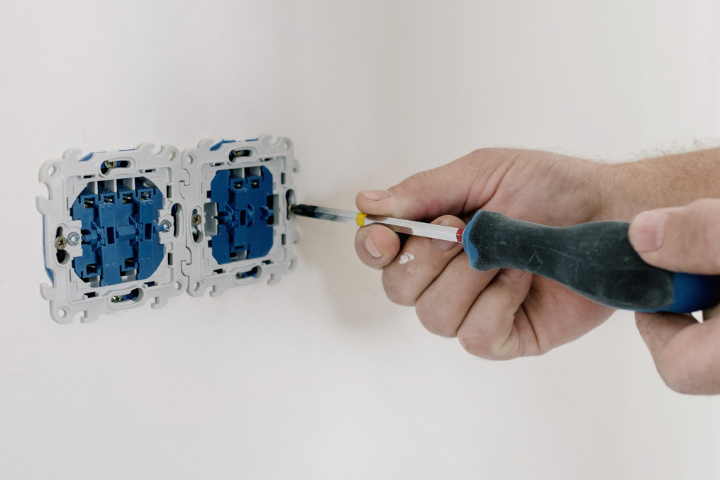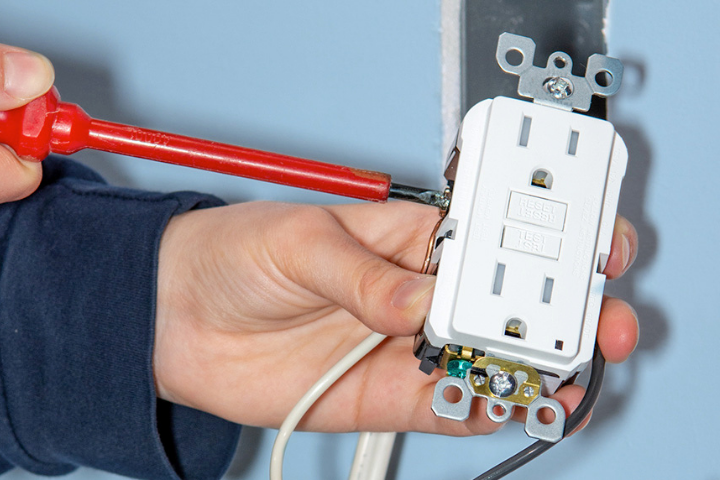Residential Electrician
Launch a Career as a Residential Electrician in as Little as 6 Weeks
Develop Confidence for Your License Exam
Prepare for an In-Demand Job! The Employment of Electricians is Projected to Grow 9% in the Next Decade
COURSE AT A GLANCE
FORMAT
Online, Self-Paced
PROGRAM LENGTH
12-Month Access, Enroll Anytime
PROGRAM HOURS
144 Course Hours
PRICE
$2,495

Prepare to Become a Residential Electrician With UTC!
With booming infrastructure, new energy conservation projects, and an aging workforce, the demand for skilled electricians is on the rise. Electricians work to install, maintain, and repair electrical power, communications, lighting, and control systems.
The electrician training course prepares you to become an electrician by teaching you general and electrical safety procedures, use of common hardware and materials used in an electrical system, how to read and understand building plans, and more. In addition, you will be prepared for electrician licensing tests, generally required by most states and localities. While tests differ per location, you will get ready to become an electrician as you broaden your understanding of electrical theory, the National Electrical Code®, local electrical codes, and the various types of wiring methods and materials.
Get Ready to Pass Your Electrical License Exam
Interested in earning your Tennessee Electrical License or even becoming an electrician in another state? Upon completing this course, you should be prepared to pass a residential electrician licensing exam and start an entry-level career as a residential electrician or electrician apprentice. Please check with your state, county, or city for residential electrician licensing rules and whether this course's hours will be accepted towards licensing. Please note that this course does not count towards getting a Massachusetts Electrician license.


What is the Difference Between a Residential Electrician and a Commercial Technician?
Residential electricians install, repair, and update electrical systems in residential homes ranging from apartment complexes to condos and townhomes. Commercial electricians work on electrical systems in commercial buildings like office parks or retail stores. The education tracts for both are similar, but the apprenticeships they pursue and the systems they work with are different.
Some of the typical job duties of a residential electrician include:
- Interpreting blueprints and technical drawings
- Installing new wiring and lighting
- Inspecting components to ensure safety and correct installation
- Maintaining home electrical systems
- Replacing broken parts
- Diagnosing critical problems in the home
- Fully understanding local and federal regulations for safe electrical systems
How Do I Become a Residential Electrician?
The course prepares you for entry-level apprentice work as an electrician.
While licensing differs from state-to-state, the licensing process:
- Begins with an apprenticeship (0-4 years)
- Then journeyman (5-6 years)
- And ends with master electrician
In the state of Tennessee, electrical licenses are issued at both a local level and state level. Tennessee residents can learn more about the different types of electrical licenses and their requirements on Tennessee’s Department of Commerce & Insurance website.


What is the Job Outlook for Electricians?
The electrician industry is constantly growing! The U.S. Bureau of Labor Statistics says that employment of electricians is projected to grow 9 percent from 2020 to 2030, about as fast as the average for all occupations.
About 84,700 openings for electricians are projected each year, on average, over the decade. Many of those openings are expected to result from the need to replace workers who transfer to different occupations or exit the labor force, such as to retire.
How Much Can I Make as an Electrician?
The median annual wage for electricians was $56,900 in May 2020.
Electricians in Tennessee can earn various wages based on their level of electrical licensure. Apprentice-level jobs pay an average of $17.24 per hour, based on an average of 127 salaries. As you earn more experience and licenses later down the road, earning potential increases significantly.
What You Will Learn in the Course
- Branch and feeder circuits with various types of cable and conduit
- Service of circuit breakers, lighting fixtures, receptacles, switches, paddle fans, and electric motors
- Identifying and fixing electrical problems on "service calls"
- Installation, maintenance, and troubleshooting photovoltaic renewable energy systems
Course Prerequisites
While not required, it is recommended that a person taking this course have some basic knowledge of direct current and alternating current electrical theory.


How You Will Benefit from the Course
- This course provides foundational knowledge and skills that are required of an entry-level electrician
- You will understand how to use the National Electrical Code, sizing electrical boxes, sizing circuit conductors, sizing fuses or circuit breakers, and sizing service entrance conductors
- You will gain valuable wiring skills, such as proper use of hand and power tools, splicing wires together properly, attaching electrical boxes to building framing members, fishing a cable in an existing wall, and installing an overhead service entrance
Meet Your Instructors
Greg Fletcher has over 40 years of experience in the electrical field as both a practicing electrician and as an electrical instructor. He has been a licensed electrician since 1976 and currently holds a Master Electrician's License in the State of Maine. In 1988, he was appointed as the Department Chairman of the Trades and Technology Department and Program Director/Instructor of the Electrical Technology program at Kennebec Valley Community College in Fairfield, Maine. He is the author of several textbooks including Residential Construction Academy: House Wiring, Guide to Using the National Electrical Code, and The Electrician's Guide to Photovoltaic System Installation. He has an associate's in Electrical Construction and Maintenance, a Bachelor of Science in Applied Technical Education, and a Master of Science in Industrial Education.
Jorge Garcia has over 20 years of experience in the electrical field as both a practicing and electrical instructor. He has been a licensed electrician since 2000 and currently holds an Electrical Contractor and Master Electrician license from Texas. Jorge currently serves as the Department Chair for Construction, Manufacturing, Transportation Technology at Texas Southmost College. Additionally, he has over 15 years in business as an Electrical Contractor for Exit Light Services. Jorge has an Associate degree in Electrician Technology, a Bachelor of Science in Criminal Justice, a Master of Science in Management and Leadership, and is currently in a Learning Technology Ph.D. program. He also holds a Fire Suppression License from the State Fire Marshal Office, Licensed Irrigator, Limited License Electrician from Tennessee, License in Bilingual & Technology Education from Texas Education Agency, National Center for Construction Education & Research (NCCER) Electrical Instructor Certification, and an Occupational Safety and Health Administration (OSHA) Authorized Trainer license.
Frequently Asked Questions

Enrollment FAQs
Can I register for a course if I am an international student?
Yes. The course is completely online. However, keep in mind that not all certifying bodies or industry-specific certifications are recognized internationally. Please review your country's regulations prior to enrolling in courses that prepare for certification.
When can I start the course?
This course is open enrollment, so you can register and start the course as soon as you are ready. Access to your course can take 24-48 business hours.
Can I get financial assistance?
This course is non-credit, so it does not qualify for federal aid, FAFSA and Pell Grant. In some states, vocational rehab or workforce development boards will pay for qualified students to take our courses. Additionally, some students may qualify for financial assistance when they enroll, if they meet certain requirements. Financing is available from select schools. Learn more about financial assistance.
Course FAQs
How long does it take to complete this course?
This course is self-paced and open enrollment, so you can start when you want and finish at your own pace. When you register, you'll receive twelve (12) months to complete the course.
What if I don't have enough time to complete my course within the time frame provided?
The time allotted for course completion has been calculated based on the number of course hours. However, if you are unable to complete the course, contact the student advising team to see what options you may have available to work out a suitable completion date. Please note that an extension fee may be charged.
What kind of support will I receive?
The course instructor will be available by email to answer any questions and provide feedback on your performance. Occasionally, your course may be supported by a team of industry experts. You will also receive support from the student advising team.


Certification FAQS
Does this course prepare for a professional certification?
No, but it does prepare you to sit for entry-level electrician licensure exams and/or prepare you for residential electrician apprentice work.
Post-Course FAQS
What happens when I complete the course?
Upon successful completion of the course, you will be awarded a Certificate of Completion.
Am I guaranteed a job?
This course will provide you with the skills you need to obtain an entry-level position in most cases. Potential students should always do research on the job market in their area before registering.